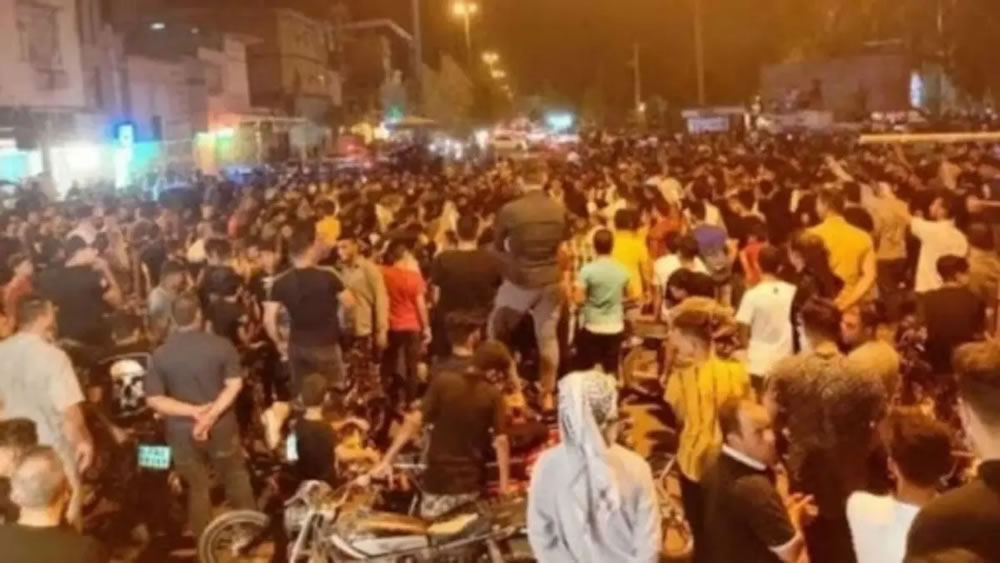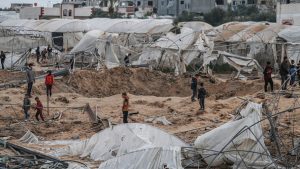Since July 16, an uprising which started in Iran’s oil-rich Khuzestan province over severe water and power shortages has spread to at least 17 cities. The power cuts are reported to be the most widespread power cuts since Iran’s war with Iraq in the 1980s.
Over the past week, thousands of demonstrators have taken the streets in the southwest of the country. They have organized multiple strikes, sit-ins, intercity road blockades, and demonstrations, chanting anti-government slogans as they demand greater access to water for drinking, their farmlands, and their cattle.
To quell the protests, Iranian police and riot police have used tear gas, shrapnel shells, and live ammunition. So far, at least four protestors from Khuzestan have been killed by security forces. The number of people who have been injured or arrested in the demonstrations is still unknown. In many parts of Khuzestan province, protestors have also reported internet shutdowns and slowdowns.
The defiant youth, women, and ethnic minorities, including Iranian Arabs and Bakhtiari Lurs, have openly confronted the Iranian regime during the protests with slogans like “Death to the Islamic Republic” and “We are thirsty! We want the regime to fall!” These sectors have also called for unity among the region’s various ethnic groups: “Bakhtiari with the Arabs, unity of the alliance” and “Do not be afraid, do not be afraid, we are all together!”
Beyond the continuous interruptions in the supply of water and electricity in urban and rural areas, in Tehran, a mass of mostly woman subway demonstrators chanted “Death to the Islamic Republic” after a government-issued reduction of subway traffic. With subways arriving less frequently, subways have become extremely overcrowded in the midst of Iran’s fifth wave of the pandemic.
A group of human rights activists, workers, teachers, and mothers of those killed in protests gathered to protest in front of Tehran’s Interior Ministry in solidarity with protesters in Iran’s drought-ridden Khuzestan Province. They were attacked by security forces. A number of protestors were severely beaten and arrested, including the prominent human rights activist Narges Mohammadi.
In recent weeks, this uprising — along with the heroic struggles of the over 100,000 contract and project workers of the oil and petrochemical industry, whose main centers are in Khuzestan — and other prominent ongoing strikes, like that of the militant workers of Haft Tappeh Sugarcane Factory, has drawn attention to the untenable social situation in Iran. In addition to its reactionary bourgeois regime, Iranians also bear the brunt of “maximum pressure” sanctions inflicted by U.S. imperialism. With an inflation rate of over 50 percent, high unemployment, and rising living costs, much of the country is in a state of misery.
As the situation develops, the struggle against resource deprivation in Khuzestan along with the struggles of various other social sectors, most prominently, the oil workers on strike have the potential to converge. Already, labor activists across various sectors are calling for nationwide and united protests and actions.
Khuzestan is thirsty!
Iran — a country that ranks fourth in the world in terms of water scarcity — is facing its worst drought in 50 years and this severe water crisis has led to a destruction of agriculture and widespread unemployment for Iranians in the drought-ridden region. In addition to climate change, the water crisis Iranians experience today is the result of decades of resource mismanagement by a bourgeois regime that prioritizes capitalist profit for Iran’s ruling elite and is indifferent to the country’s depleted resources.
Despite once being a lush and fertile region with one of the largest lagoons in the region, Khuzestan’s ecosystem has been disrupted by destructive dam construction and water diversion policies over the span of three decades. These policies stem from the activities of the National Oil Company of Iran in the region and construction projects initiated after the destructive war with Iraq that turned the Mesopotamian wetland into a wasteland. Khuzestan consequently became one of the poorest and most deprived provinces of Iran.
Many cities in Khuzestan lack running water, which means that local populations are dependent on water tank deliveries for access to clean water. They have to wait hours and hours just to receive a few cans of water. This means that farmers are left without a means of subsistence, families lack adequate drinking water, and whole shoals of fish wash up dead on dried-up riverbeds. Environmental activists warned officials about water management and the state of the environment for years, but they were repressed, imprisoned, and eventually expelled from the country.
According to the Iranian Department of Water and Sewerage, at least 110 Iranian cities (many of them in Khuzestan province) have been struggling with regular water cuts during the summer of 2021 due to extremely hot temperatures and droughts that have led to widespread blackouts and water shortages. Government officials acknowledge that the province has been hit hard, and outgoing President Hassan Rouhani has promised to allocate funds and water tankers to the thirsty and discontent region.
Since the Iranian revolution, Iran has subsidized petroleum products, basic foodstuffs, medical goods, and utilities (water, power and sewage) to appease the war-weary population in the years during and after the war with Iraq. Attempts at market-driven subsidies reform and an austerity plan directed by then-President Hashemi Rafsanjani in the 90s sparked demonstrations across the country, forcing his administration to shelve subsidy cutbacks and many free-market reforms. In the face of sanctions and the Great Recession, Iran’s populist former president Mahmoud Ahmadinejad carried out a subsidy reform program for energy and bread, raising prices on these productions; in return, the government handed poor households cash transfers. The harsher sanctions imposed during the Trump administration and a deepening structural crisis led to new attempts at subsidy reform, including president Rouhani’s increase of petrol prices by 50 percent in November 2019 — a move that led to a powerful anti-government rebellion across the country.
The regime is currently facing a delicate situation in which a deep and unresolved structural crisis, intensified by the pandemic, has led to a reduction in industries’ working hours, cuts to electricity exports to Iraq, and a crackdown on bitcoin mining to both tackle power outages and prevent greater subsidies reforms that could add volatility to an already precarious social situation. But these moves under the government of Hassan Rouhani were only able to temporarily contain public anger about power shortages and they had severe economic consequences for an economy suffering from crippling U.S. sanctions.
Iran’s new president, Ebrahim Raisi, already marred by the lowest turnout ever in a presidential election, is due to be sworn in at the beginning of August; he will inherit Iran’s intersecting and acute problems. He is likely betting on sanctions relief if and when a new nuclear deal is agreed upon by Iran, the U.S., and its allies; however this doesn’t necessarily preclude the ayatollahs from attempting to apply brutal austerity measures on the popular classes.
With Iran in the headlines, Republican politicians in the U.S. like Marco Rubio and Claudia Tony, a representative from New York, have condemned the repressive regime and expressed solidarity with Iranian protesters. But these Republicans hide their desires for a reactionary regime change in the interest of U.S. capital behind empty platitudes. While many Democrats and the Biden administration prefer a more “diplomatic” approach to securing North American interests in the region, the continuation of Trump’s “maximum pressure” sanctions that deprives Iranians more and more everyday underscores the overlapping interests of both imperialist parties in the United States. As history has proven time and time again, nothing good comes out of U.S. intervention.
Amid the growing discontent with a repressive regime and the miserable and deteriorating conditions the popular classes in Iran face, the social sectors who have been active on the streets are gaining experience with each new wave of struggle.
These reawakening sectors have the potential to expand the scope and scale of the current unrest in Iran, which includes the massive oil workers strike, if they are able to coordinate and unify the struggles at hand. Furthermore, one of the most encouraging aspects of the working class strikes and actions is the development of nascent self-organizing bodies, currently in the form of strike organizing committees which could be nationalized and turned into a place for collective decision-making for those engaged in struggle — using the example of the proto-soviets that emerged during the Iranian Revolution, the shoras.
This new tide of protests and organizing among the oppressed and exploited in Iran has the potential to inspire struggling masses throughout the Middle East beyond the borders of Iran, who face the exploitative forces of similar reactionary bourgeois regimes and have born the brunt of U.S. imperialism’s deadly policies. Within the imperialist core, demonstrations in support of the Iranian protests are also taking shape with solidarity protests scheduled for Friday in Dallas, Texas by the North American Bakhtiari Association and protests tomorrow at Washington Square Park in New York City, in addition to recent protests in London. The Left in countries like the United States has a special responsibility to denounce the criminal U.S. policy of sanctions and blockades that inflict the greatest level of harm on the masses in countries like Cuba and Iran.











